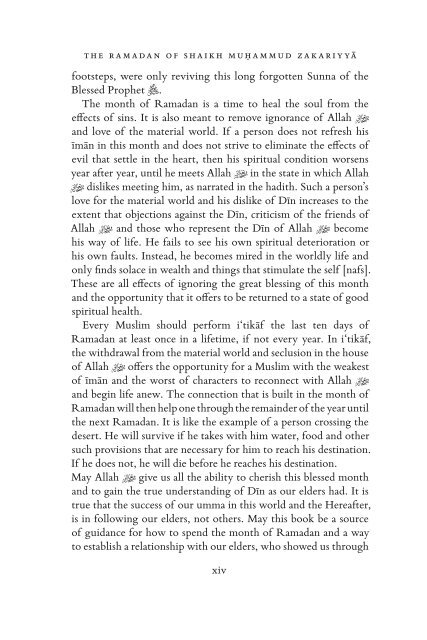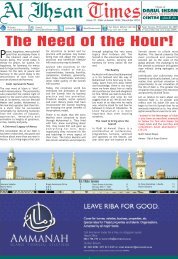TheRamadan of Shaykh Al-Hadith Ml ZakariyyaKandelwi by Dr Muhammad Ismail Memon Madani
TheRamadan of Shaykh Al-Hadith Ml ZakariyyaKandelwi by Dr Muhammad Ismail Memon Madani
TheRamadan of Shaykh Al-Hadith Ml ZakariyyaKandelwi by Dr Muhammad Ismail Memon Madani
You also want an ePaper? Increase the reach of your titles
YUMPU automatically turns print PDFs into web optimized ePapers that Google loves.
the ramadan <strong>of</strong> shaikh muĤ ammud zakariyyĀ<br />
footsteps, were only reviving this long forgotten Sunna <strong>of</strong> the<br />
Blessed Prophet s.<br />
The month <strong>of</strong> Ramadan is a time to heal the soul from the<br />
effects <strong>of</strong> sins. It is also meant to remove ignorance <strong>of</strong> <strong>Al</strong>lah u<br />
and love <strong>of</strong> the material world. If a person does not refresh his<br />
īmān in this month and does not strive to eliminate the effects <strong>of</strong><br />
evil that settle in the heart, then his spiritual condition worsens<br />
year after year, until he meets <strong>Al</strong>lah u in the state in which <strong>Al</strong>lah<br />
u dislikes meeting him, as narrated in the hadith. Such a person’s<br />
love for the material world and his dislike <strong>of</strong> Dīn increases to the<br />
extent that objections against the Dīn, criticism <strong>of</strong> the friends <strong>of</strong><br />
<strong>Al</strong>lah u and those who represent the Dīn <strong>of</strong> <strong>Al</strong>lah u become<br />
his way <strong>of</strong> life. He fails to see his own spiritual deterioration or<br />
his own faults. Instead, he becomes mired in the worldly life and<br />
only finds solace in wealth and things that stimulate the self [nafs].<br />
These are all effects <strong>of</strong> ignoring the great blessing <strong>of</strong> this month<br />
and the opportunity that it <strong>of</strong>fers to be returned to a state <strong>of</strong> good<br />
spiritual health.<br />
Every Muslim should perform i‘tikāf the last ten days <strong>of</strong><br />
Ramadan at least once in a lifetime, if not every year. In i‘tikāf,<br />
the withdrawal from the material world and seclusion in the house<br />
<strong>of</strong> <strong>Al</strong>lah u <strong>of</strong>fers the opportunity for a Muslim with the weakest<br />
<strong>of</strong> īmān and the worst <strong>of</strong> characters to reconnect with <strong>Al</strong>lah u<br />
and begin life anew. The connection that is built in the month <strong>of</strong><br />
Ramadan will then help one through the remainder <strong>of</strong> the year until<br />
the next Ramadan. It is like the example <strong>of</strong> a person crossing the<br />
desert. He will survive if he takes with him water, food and other<br />
such provisions that are necessary for him to reach his destination.<br />
If he does not, he will die before he reaches his destination.<br />
May <strong>Al</strong>lah u give us all the ability to cherish this blessed month<br />
and to gain the true understanding <strong>of</strong> Dīn as our elders had. It is<br />
true that the success <strong>of</strong> our umma in this world and the Hereafter,<br />
is in following our elders, not others. May this book be a source<br />
<strong>of</strong> guidance for how to spend the month <strong>of</strong> Ramadan and a way<br />
to establish a relationship with our elders, who showed us through<br />
xiv



